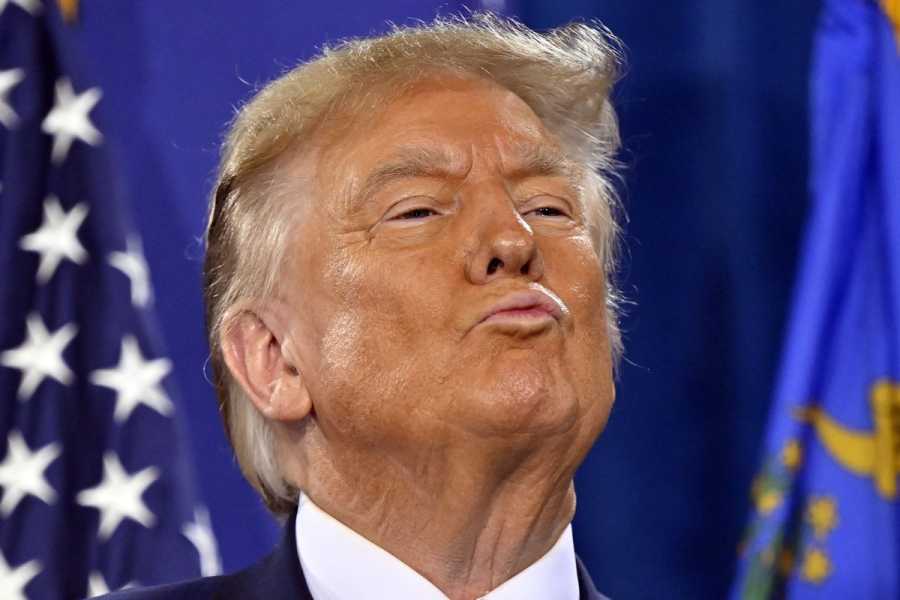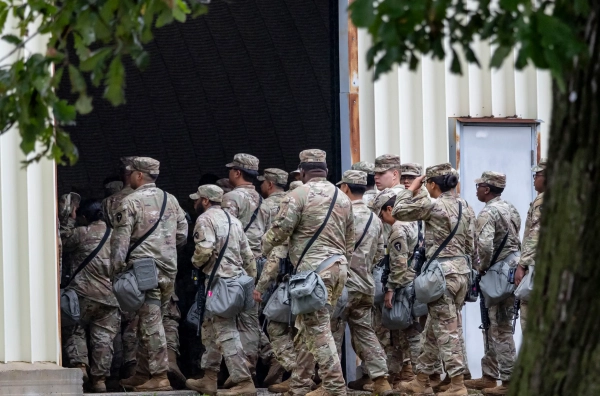Trump’s Supreme Court lawyer was a disaster, and it won’t matter one bit.

Republican presidential candidate and former U.S. President Donald Trump stands on stage during a campaign event at Big League Dreams Las Vegas on January 27, 2024 in Las Vegas. Photo by David Becker/Getty Images Ian Millhiser is a senior correspondent at Vox, where he focuses on the Supreme Court, the Constitution, and the decline of liberal democracy in the United States. He received a JD from Duke University and is the author of two books on the Supreme Court.
Two things were obvious Thursday morning in the Supreme Court, where the justices pondered whether former President Donald Trump is disqualified from seeking the presidency because of his role in inciting the January 6 insurrection at the US Capitol.
One is that Jonathan Mitchell, the lawyer representing Trump, was in way over his head. During Mitchell’s time at the podium, the justices took turns ripping apart his arguments — or even criticizing him for abandoning stronger legal arguments in favor of weaker ones. Mitchell also made embarrassing concessions, admitting that he had no historical evidence to support some of his key claims.
The other obvious thing is that it didn’t matter: Trump is going to win. After Mitchell stepped down from the podium, after emphasizing two arguments that nearly all the justices appeared to view as weak, most of the Court spent the rest of the argument trying to come up with a better reason to rule in favor of Trump.
In this case, Trump v. Anderson, the Colorado Supreme Court determined that Trump must be removed from its presidential ballot under a provision of the 14th Amendment that prohibits former high-ranking officials who engage in an “insurrection” from serving in office again.
The Court appears likely to rule that this decision was wrong because state courts, as opposed to federal courts or Congress, may not determine that a presidential candidate is ineligible. As Justice Elena Kagan, an Obama appointee, said at one point, the question of who can seek the highest federal office “sounds awfully national to me,” and thus should be resolved in a federal forum.
Most of the justices piled on with similar arguments. One leading concern, raised by several justices, is that there could be competing decisions reaching competing conclusions if each state is allowed to determine whether a candidate is ineligible for the presidency.
Justice Amy Coney Barrett, for example, worried that each state’s courts will have different evidentiary rules, and will assemble different records, when they hear lawsuits challenging a candidate’s eligibility. Worse, because the Supreme Court is ordinarily supposed to defer to a trial court’s fact-finding process, the justices may be “stuck” with the factual conclusions reached by the “first mover” state — even if those conclusions were wrong.
Similarly, Chief Justice John Roberts warned that some states would use the power to disqualify candidates maliciously. “I would expect that a goodly number of states will say ‘whoever the Democratic candidate is, you’re off the ballot,’” Roberts predicted.
So Trump is overwhelmingly likely to win. And it appears he will win on the grounds that a single state should not be able to determine who gets to run for federal office.
The open questions are how the Supreme Court will come up with a legal argument to justify this outcome, and whether they will permit the disqualification issue to be raised again in federal court.
Trump’s lawyer gave the justices nothing to work with
Mitchell is best known as the architect of Texas’s SB 8, the unusual anti-abortion law that allowed bounty hunters to collect potentially limitless bounties from abortion providers. He is the kind of lawyer who favors pedantic, highly technical arguments that read legal texts to achieve surprising or even absurd results.
This penchant was on full display during Mitchell’s 40 or so agonizing minutes at the Supreme Court podium, where Mitchell focused on two arguments.
The first relies on the fact that the 14th Amendment says that a former “officer of the United States” may not serve in office again if they engage in insurrection. Mitchell claims that the president is not such an officer — so the implication of his argument is that sub-presidential officials may not engage in insurrection, but if the commander in chief of the military does so, there’s no consequence.
But only Justices Neil Gorsuch and Ketanji Brown Jackson appeared open to this counterintuitive reading of the Constitution. Jackson is a Biden appointee, and her willingness to consider this argument was the biggest surprise of the day: She had a theory that the framers of the 14th Amendment were primarily concerned with “preventing the South from rising again” by winning “local elections,” as opposed to national ones.
Mitchell’s other argument was even sillier. He claimed that Colorado cannot disqualify Trump from the ballot because the 14th Amendment allows Congress to remove an insurrectionist candidate’s disqualification by a two-thirds vote. Mitchell’s argument was that Congress could hypothetically vote to requalify Trump before he takes office, so Colorado cannot disqualify him now.
This argument landed with a thud before the justices. Even Justice Samuel Alito, who is ordinarily the Court’s most reliable Republican partisan, mocked Mitchell’s claim — analogizing it to a criminal defendant who claims they can’t be prosecuted because there is a hypothetical possibility that the governor could pardon them.
So it was possible to hope, if you are eager to see Trump disappear from American political life, that the Court could rule against Trump when Mitchell completed his argument. The former president’s lawyer was an embarrassment, and he left the justices without any serious arguments they could write into an opinion favoring Trump.
But then most of the justices spent the second half of the arguments trying to come up with a way to rule in favor of Trump anyway.
The Court is likely to rule that state courts cannot decide who is disqualified from the presidency
A few justices tossed out their own idiosyncratic theories for how Trump could prevail. Justice Brett Kavanaugh, for example, leaned heavily into In re Griffin (1869), a post-Civil War opinion written by Chief Justice Salmon Chase when Chase was temporarily serving on a lower court, which held that “legislation by congress is necessary” to enforce the 14th Amendment’s disqualification provision.
Similarly, Justice Jackson pushed her argument that the framers of the 14th Amendment were primarily concerned with Confederates worming their way into lower offices — a position that no other justice seemed to find persuasive.
But the most common concern, which was repeatedly raised by several justices, was that a state court simply shouldn’t be the one to decide who gets to serve as president — even if there is a constitutional provision disqualifying certain candidates.
The biggest obstacle facing the justices who wish to reach this conclusion is that the text of the Constitution doesn’t really support it. The 14th Amendment’s language does not distinguish between state and federal proceedings. It simply declares that certain former officials who “have engaged in insurrection or rebellion” may not hold office again.
Shortly after Jason Murray, the lawyer representing the Colorado voters who claim Trump is ineligible, took the podium, Justice Clarence Thomas suggested one way that the Court could reach what appears to be its preferred result. Thomas asked if there are any examples in the period immediately following the 14th Amendment’s post-Civil War ratification where a state declared that a federal candidate was ineligible for office.
Murray did point to one example where the governor of Georgia refused to certify an ex-Confederate’s election to Congress, but he was not able to come up with another example — though he did have an explanation for why few such examples exist.
According to Murray, the United States didn’t start using modern ballots until the 1890s. Before then, voters would write names on a paper or submit a preprinted ballot given to them by their party, rather than choosing from a list of candidates on a ballot provided by the state. For this reason, he argued, there were no opportunities for a state court to rule that an ex-Confederate should be excluded from a particular ballot.
Thomas, however, did not appear satisfied by this explanation, and he appeared to view the lack of contemporaneous evidence that the 14th Amendment was understood to permit a state lawsuit like Trump v. Anderson as dispositive.
Chief Justice Roberts, meanwhile, suggested another rationale for ruling that Trump cannot be excluded by a state court. The bulk of the 14th Amendment, he noted, imposes restrictions on state power. The amendment prohibits states from denying due process to individuals, for example, or from denying them “the equal protection of the laws.” Meanwhile, the amendment expands federal power, by giving Congress the authority to enforce its restrictions against the states.
Given this structure, Roberts argued that the 14th Amendment is “the last place you’d look” for a provision authorizing a state to do anything, much less remove a federal candidate from the ballot. In Roberts’s mind, the amendment is entirely focused on limiting state authority.
In any event, enough justices raised concerns about what would happen if each state got to decide whether Trump (or President Joe Biden, for that matter) can seek the presidency that it appears very likely the Court will come up with a reason to say that states cannot do this. Perhaps that argument will resemble Thomas’s historical claims, perhaps it will resemble Roberts’s more structural argument, or perhaps it will be something else entirely. But the justices’ practical concerns about letting these cases be resolved by states appeared to overwhelm any concerns they had about the text of the Constitution.
Of course, the big looming question, if the Court does rule that state courts may not decide whether Trump is disqualified, is what happens when someone inevitably files a federal lawsuit making the same legal arguments presented by Trump v. Anderson. Similarly, what happens if Trump is convicted for his attempt to steal the 2020 election, and the trial judge determines that disqualification for office should be part of his sentence?
If the Court’s decision is limited to what state courts can do, these questions will still loom over the 2024 election. And Mitchell’s dismal performance on Thursday suggests that Team Trump does not have even remotely plausible answers to these questions.
Sourse: vox.com






